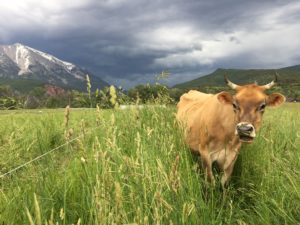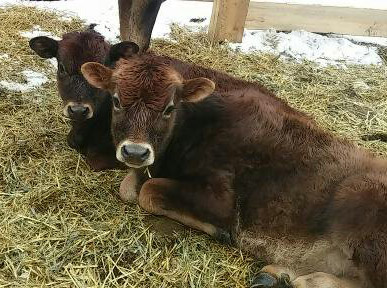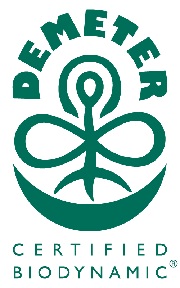
Here’s how to get started with our Herd Share Program
- Start with a visit to the ranch, a meet and greet, where you may meet the ladies and staff if you wish to.
- Review and sign herd-share paperwork.
- Each herd-share entitles you to (1) gallon of milk per week.
- Total monthly fee per share (1 gal/week/share) is $100. This includes the annual jar fee, annual membership fee, and the monthly boarding fee.
- Payment methods 1) recurring monthly credit card payment or a monthly draw out of a checking account. Your credit card will be charged on the 5th of each month. 2) Cash. 3)Check
- Your milk should be picked up on your designated pickup day (same day each week) and will remain in the fridge for one week after your date, due to limited space.
- You are responsible for your weekly milk pick-up while you are away. Exceptions may be made. If you are away for one month or more we can put your share on hold, but that does not guarantee that you will be be able to start up again on your return.
- Additional dairy products like cream, butter, kefir, yogurt, are available first come first serve. These products need to be paid for when you pick them up.
- Additional milk may be available.
- Please return jars clean! This is a safety issue. This is not optional, do not return jars stinking of old milk, pickles, tomato sauce or things. Also, please do not leave lids and rings in the bottom of the sink to rust.
- You may cancel your share at any time with one weeks notice.
**Please note quantities are extremely limited; thank you for your patience while we grow our herd.
For more information or to schedule a visit call 970-963-6107 or email rose@sustainablesettings.org
Currently our herd consists of A2/A2 Guernsey, Jersey, Dutch Belt, Normandy, and Brown Swiss cows. While Guernsey’s are the breed highest in Vitamin A content, Jersey’s are highest in butterfat. Dutch belt’s are a good dual purpose breed. Brown Swiss are well tolerant of extreme weather, high elevation are generally docile. We’ve carefully selected our initial breeding stock from around the country to be of healthy diverse genes, concerned with quality not quantity. Our cows are fed only grass and legumes or hay, depending on the season, are holistically grazed, with no grain in their diet. All of our milkers receive Helfter’s 12 Stone Mineral Program, Organic kelp, and Redmond Salt. For more information on the 12-Stone Mineral Program please visit http://www.abcplus.biz
Thank you for your interest in our Raw Dairy program. Raw Dairy is available in Colorado only if you own your own cow or enter into a herd-share agreement. Because owning your own cow is A LOT of work, Sustainable Settings Ranch has developed a program for our local community to gain access to the purest milk possible without all that trouble.
“The day will come when no conscientious couple will dream of starting a family until they have found a source of pure and healthy raw milk for their children; when no town planners will proceed without first setting aside the most fertile land for the local dairy; when no doctor will omit raw milk as part of their treatment; and when no government official will dare to impede access in any way to raw milk and other pure foods.” – Sally Fallon, President, The Weston A. Price Foundation, July, 2003, Washington D.C.
 We offer Biodynamic organic products
We offer Biodynamic organic products
FAQ’s
Why raw milk?
Visit a Campaign for Real Milk
The 15 things pasteurization kills
A Tale of Two Calves – Michael Schmidt
“To ignore the health intangibles is inexcusable for anyone concerned with human well-being. The full impact of the intangibles can only be appreciated when a comparison is made between the favorable health benefits of raw milk noted by Dr. Sanford and his predecessors dating back to the time of Hippocrates, and the negative values of today’s pasteurized milk. No one would expect health benefits from an exclusive pasteurized milk diet. It has no medical sponsors or curative value. Medical enthusiasm for milk as a therapeutic agent suffered an abrupt ending with the advent of pasteurization, and its killing of milk enzymes. An important conclusion emerges from studying the long history of milk as food and medicine: When one takes enzymes away from milk, it loses some of its health value and most of its curative properties. The virtue of effective foods resides in their possession of all of the nutritional factors nature gave them. The status raw milk gained as a remedy for chronic diseases through hundreds of years vanished with the coming of pasteurized milk.” -Howell, Edward. Enzyme Nutrition: The Food Enzyme Concept. Avery, New York, 1985
Why A2?
A2 beta-casein protein is the original milk protein, A1 being the mutated gene. Some people are intolerant to the A1 beta-casein. Symptoms can be close to those of lactose intolerance. Milks containing mostly A2 proteins are often said to be better for ‘allergies’ (such as gut, skin rashes, hayfever, cough). There is also research to suggest that A1 beta casein may be associated with serious health conditions such as heart disease, diabetes type 1 and autism. *Food Intolerance Network
Why grass-fed only?
“Conjucated linoleic acid (CLA) is an omega-6 fatty acid found in meat and milk that in recent years has been shown to play an important role in disease protection and the maintenance of optimal health. Nonfat dairy products contain no CLA. A recent article in the Journal of Dairy Science reported that milk from grassfed cows contains up to five times more CLA than milk from conventionally fed cows. Other workers found that to produce milk with the highest possible content of conjugated linoleic acid the cows must be fed no grain at all; feeding 15 pounds of grain per day lowered the CLA content of the milk to the amount found in the milk of confinement cows. Only whole milk from cows on grass contains significant amouns of CLA.” -Schmid, Ron, The Untold Story of Milk
“In my own practice, I have seen time and again that raw milk from animals fed only or mostly grass and hay often have profoundly superior effect on my patients compared to raw milk from animals fed quantities of grain.” -Ron Schmid ND
Only cows fed grain can pass E-Coli on through their milk, due to the acidity change in the bovine stomach. Grassfed only cows can never pass E-Coli.

